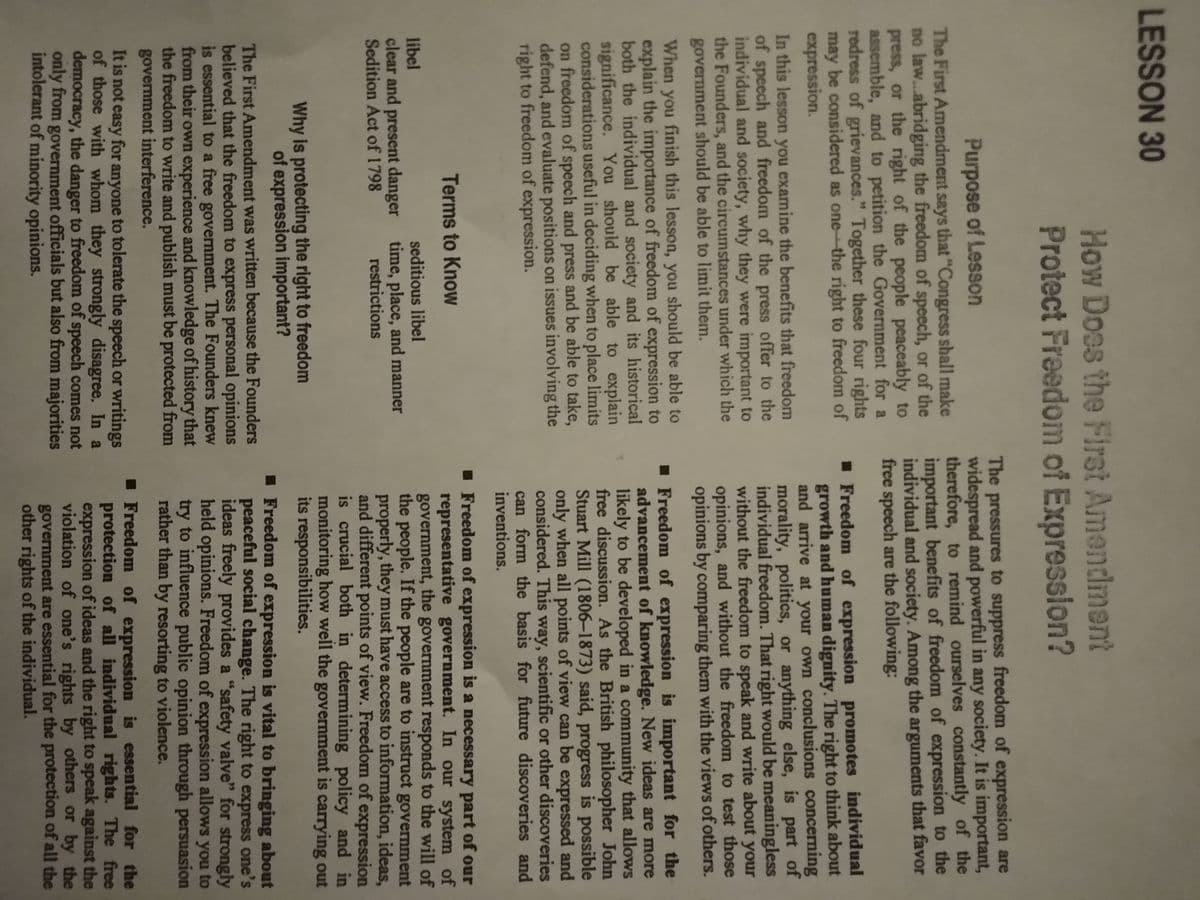The article in the image lists 5 arguments for why freedom of speech is important. Is the 5th argument most convincing to you? Why?
The article in the image lists 5 arguments for why freedom of speech is important. Is the 5th argument most convincing to you? Why?
Related questions
Question
100%
The article in the image lists 5 arguments for why freedom of speech is important. Is the 5th argument most convincing to you? Why?

Transcribed Image Text:LESSON 30
How Does the First Amendment
Protect Freedom of Expression?
Purpose of Lesson
The First Amendment says that "Congress shall make
no law...abridging the freedom of speech, or of the
press, or the right of the people peaceably to
assemble, and to petition the Government for a
redress of grievances." Together these four rights
may be considered as one the right to freedom of
expression.
In this lesson you examine the benefits that freedom
of speech and freedom of the press offer to the
individual and society, why they were important to
the Founders, and the circumstances under which the
government should be able to limit them.
When you finish this lesson, you should be able to
explain the importance of freedom of expression to
both the individual and society and its historical
significance. You should be able to explain
considerations useful in deciding when to place limits
on freedom of speech and press and be able to take,
defend, and evaluate positions on issues involving the
right to freedom of expression.
Terms to Know
libel
clear and present danger
Sedition Act of 1798
seditious libel
time, place, and manner
restrictions
Why is protecting the right to freedom
of expression important?
The First Amendment was written because the Founders
believed that the freedom to express personal opinions
is essential to a free government. The Founders knew
from their own experience and knowledge of history that
the freedom to write and publish must be protected from
government interference.
It is not easy for anyone to tolerate the speech or writings
of those with whom they strongly disagree. In a
democracy, the danger to freedom of speech comes not
only from government officials but also from majorities
intolerant of minority opinions.
The pressures to suppress freedom of expression are
widespread and powerful in any society. It is important,
therefore, to remind ourselves constantly of the
important benefits of freedom of expression to the
individual and society. Among the arguments that favor
free speech are the following:
■ Freedom of expression promotes individual
growth and human dignity. The right to think about
and arrive at your own conclusions concerning
morality, politics, or anything else, is part of
individual freedom. That right would be meaningless
without the freedom to speak and write about your
opinions, and without the freedom to test those
opinions by comparing them with the views of others.
■ Freedom of expression is important for the
advancement of knowledge. New ideas are more
likely to be developed in a community that allows
free discussion. As the British philosopher John
Stuart Mill (1806-1873) said, progress is possible
only when all points of view can be expressed and
considered. This way, scientific or other discoveries
can form the basis for future discoveries and
inventions.
■ Freedom of expression is a necessary part of our
representative government. In our system of
government, the government responds to the will of
the people. If the people are to instruct government
properly, they must have access to information, ideas,
and different points of view. Freedom of expression
is crucial both in determining policy and in
monitoring how well the government is carrying out
its responsibilities.
■ Freedom of expression is vital to bringing about
peaceful social change. The right to express one's
ideas freely provides a "safety valve" for strongly
held opinions. Freedom of expression allows you to
try to influence public opinion through persuasion
rather than by resorting to violence.
■ Freedom of expression is essential for the
protection of all individual rights. The free
expression of ideas and the right to speak against the
violation of one's rights by others or by the
government are essential for the protection of all the
other rights of the individual.
Expert Solution
This question has been solved!
Explore an expertly crafted, step-by-step solution for a thorough understanding of key concepts.
This is a popular solution!
Trending now
This is a popular solution!
Step by step
Solved in 2 steps
